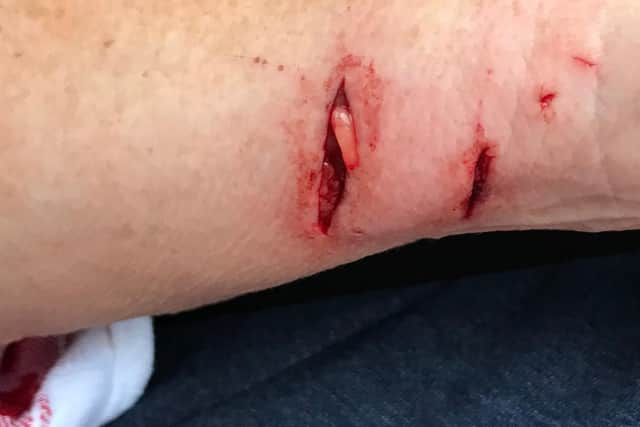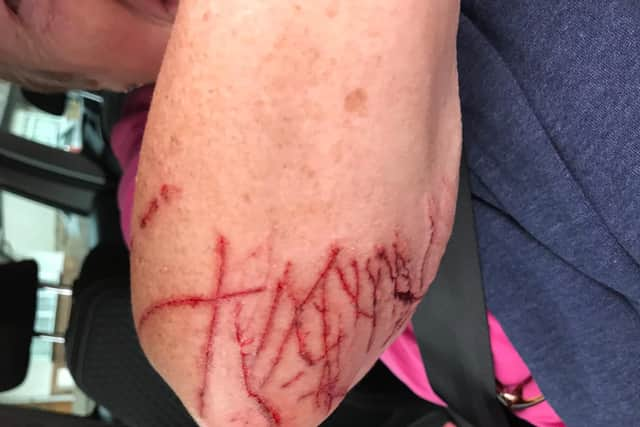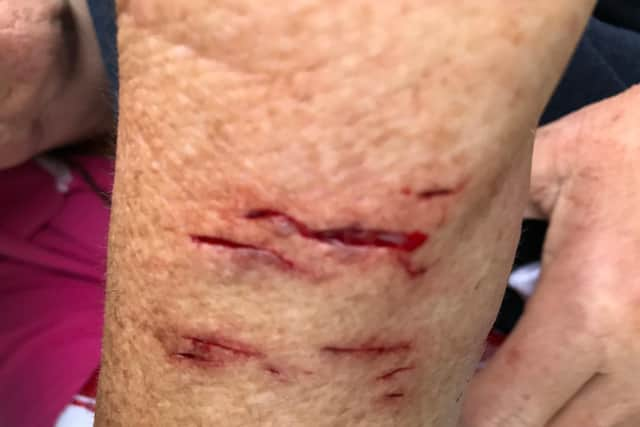Sheffield woman in hospital after savage attack from neighbour’s Bengal cat
and live on Freeview channel 276
Barbara Neal told how she was at her home in Totley when she was set upon by the cat, which belongs to a neighbour, in an unprovoked attack.
The 70-year-old former teacher is being treated at the Northern General Hospital after the gaping wounds became infected and says she has been left traumatised by the experience.
Advertisement
Hide AdAdvertisement
Hide AdShe wants to raise awareness about the danger posed by Bengal cats, a popular breed created from hybrids of domestic cats with the Asian leopard cat, which she says are naturally more aggressive and territorial than other domesticated moggies.


“This cat is allowed to wander freely and had been coming into our house, attacking our cats and stealing their food. It had broken our cat flap several times before, trying to force its way in,” she said.
“On Monday, I went into the conservatory and saw it at the bottom of a flight of steps in our garden.
“My husband picked up our cat to take it inside and I stood at the top of the steps and sort of flapped my arms, trying to tell it to go away.


Advertisement
Hide AdAdvertisement
Hide Ad“At that point, it leapt up the steps and attached itself to my arm, biting and scratching me.
“I couldn’t get it off. The only way I could manage to get free in the end was by punching it in the face.”
Ms Neal was immediately taken by her husband to Chesterfield Royal Hospital where staff washed her wounds and told her to get them checked again by her GP on Wednesday.


Her GP referred her to the Northern General Hospital, where she was given antibiotics and kept in to see how she responds.
Advertisement
Hide AdAdvertisement
Hide Ad“I’m still traumatised by what happened. I’m an ex-teacher and I’m tough as old boots but this has utterly knocked me for six and I will be scarred for life,” she said.
“I have a granddaughter and had it leapt at her the way it did at me it could have ripped her neck open.
“I won’t keep the conservatory doors open and I’m afraid to use our downstairs toilet in case it gets in through our cat flap.
“Bengal cats are a designer breed and they are beautiful but people don’t understand that they still have the aggression and territorial tendencies of a wild cat.”
Advertisement
Hide AdAdvertisement
Hide AdMs Neal told how she had called the police and the RSPCA following the attack but was told there was nothing they could do.
“If I attacked a cat that would quite rightly be a crime but there doesn’t seem to be any law that protects me and my property from being attacked by a cat,” she said.
Under the Dangerous Dogs Act, it is an offence to let a dog be dangerously out of control anywhere, but South Yorkshire Police said there is no legislation which covers cats attacking humans, and as Bengal cats are domestic no licence is required for ownership.
An RSPCA spokesperson said: “We're sad to hear that a member of the public has been left frightened and injured in this way.
Advertisement
Hide AdAdvertisement
Hide Ad“Cats may exhibit aggressive behaviour for a number of reasons - and could be because they are unwell, distressed or feel threatened by a particular situation. They may also have not been properly socialised to people.
“Where a cat is showing signs of fear or aggression, the RSPCA would always recommend giving them a lot of space, and avoiding unessential interactions.
“The RSPCA strongly recommends that cats are neutered, to help prevent fighting and other aggressive behaviour – particularly for male cats.
“We also offer advice to the public which may help safely deter aggressive neighbouring cats from properties.
“As ever, if anyone has concerns about the welfare of a cat they can call our advice and cruelty line on 0300 1234 999.”
The Star has also contacted the Bengal Cat Association.